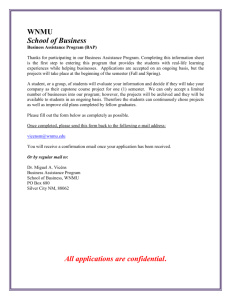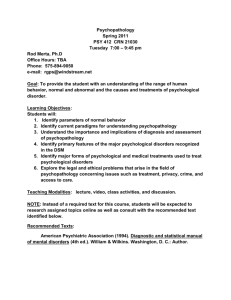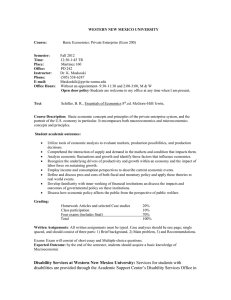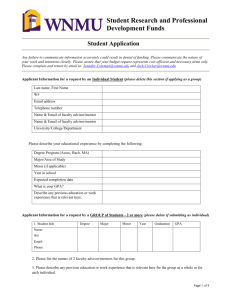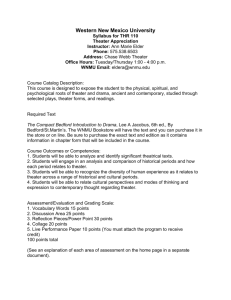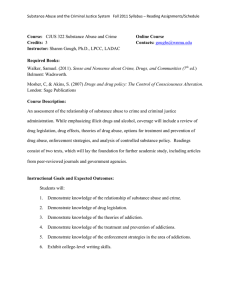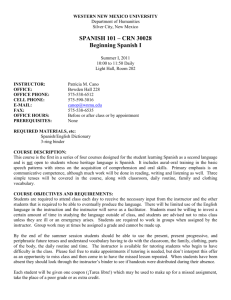Course: CJUS 322 Substance Abuse and Crime
advertisement
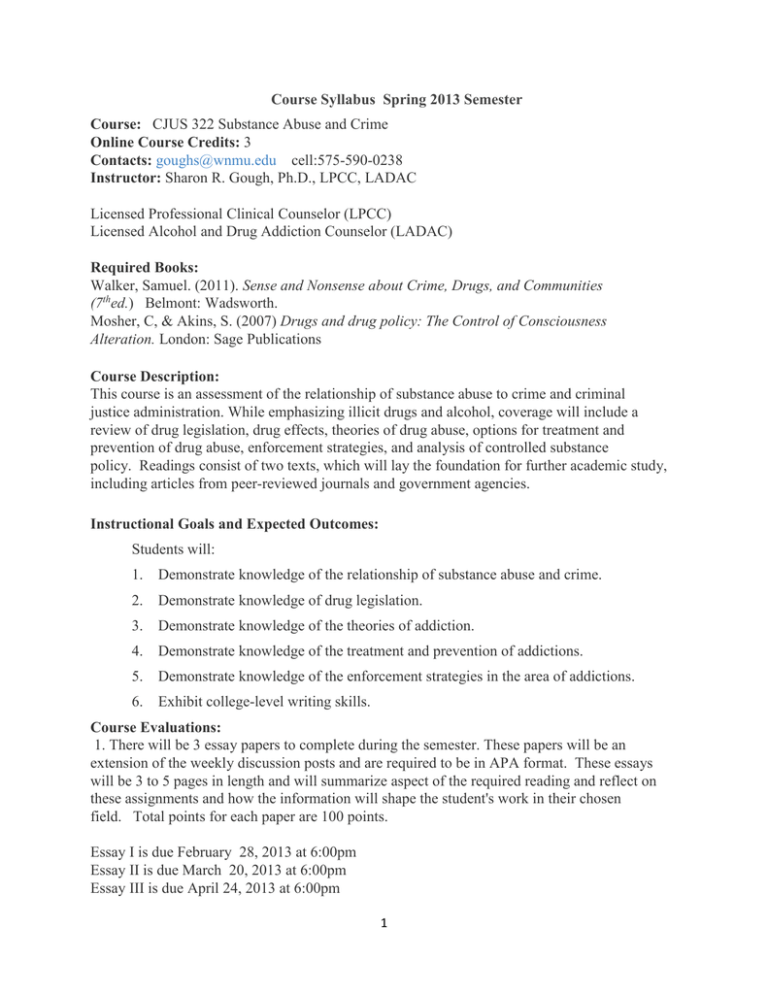
Course Syllabus Spring 2013 Semester Course: CJUS 322 Substance Abuse and Crime Online Course Credits: 3 Contacts: goughs@wnmu.edu cell:575-590-0238 Instructor: Sharon R. Gough, Ph.D., LPCC, LADAC Licensed Professional Clinical Counselor (LPCC) Licensed Alcohol and Drug Addiction Counselor (LADAC) Required Books: Walker, Samuel. (2011). Sense and Nonsense about Crime, Drugs, and Communities (7thed.) Belmont: Wadsworth. Mosher, C, & Akins, S. (2007) Drugs and drug policy: The Control of Consciousness Alteration. London: Sage Publications Course Description: This course is an assessment of the relationship of substance abuse to crime and criminal justice administration. While emphasizing illicit drugs and alcohol, coverage will include a review of drug legislation, drug effects, theories of drug abuse, options for treatment and prevention of drug abuse, enforcement strategies, and analysis of controlled substance policy. Readings consist of two texts, which will lay the foundation for further academic study, including articles from peer-reviewed journals and government agencies. Instructional Goals and Expected Outcomes: Students will: 1. Demonstrate knowledge of the relationship of substance abuse and crime. 2. Demonstrate knowledge of drug legislation. 3. Demonstrate knowledge of the theories of addiction. 4. Demonstrate knowledge of the treatment and prevention of addictions. 5. Demonstrate knowledge of the enforcement strategies in the area of addictions. 6. Exhibit college-level writing skills. Course Evaluations: 1. There will be 3 essay papers to complete during the semester. These papers will be an extension of the weekly discussion posts and are required to be in APA format. These essays will be 3 to 5 pages in length and will summarize aspect of the required reading and reflect on these assignments and how the information will shape the student's work in their chosen field. Total points for each paper are 100 points. Essay I is due February 28, 2013 at 6:00pm Essay II is due March 20, 2013 at 6:00pm Essay III is due April 24, 2013 at 6:00pm 1 2. The final examination will be comprehensive, open-booked, but timed. It will be worth a potential 100 points. Final Exam will be available from May 6th at 9:00 am through May 9th at 9:00 pm. 3. Makeup Essays: If a student does not turn in work on time penalties will be applied. It is the student’s responsibility to make arrangements with the professor for late submissions. 4. Every student will answer two weekly discussion posts to further explore the reading assignments for the week. These entries will be substantive, well written responses to the issues covered throughout the semester. In addition, each student will respond to two classmate’s discussion post in a manner that expands the discussion and is respectful of other’s perspectives. Weekly posts will count 10 points and response posts will also count 10 points. The discussion rubric will be as follows: Discussion postings provide little or no evidence of reflective thought pertaining to personal perspectives and professional development. Discussion postings provide some evidence of reflective thought pertaining to personal perspectives and professional development. Discussion postings provide evidence of some reflective thought pertaining to personal perspectives and professional development. Discussion postings provide evidence of strong reflective thought pertaining to personal perspectives and how the module's learning objectives relate to professional development. Unsatisfactory - 0% Limited - 80% Proficient - 90% Exemplary - 100% 5. Every student write a 7-9 page term paper on a topic related to substance abuse and crime worth 100 points. The topic of the paper must be approved by the professor by week 7 or before. The paper should include the following sections: cover sheets, title page, table of contents, introduction, body of paper, and references. The format of the term paper should adhere to APA (American Psychological Association) writing format. At least 5 references must be used for this paper, preferably from peer-reviewed journal articles. All late papers will be assessed a 10% penalty. 40% of the grade for this paper will be for format and 60% will be for content. Term papers are due last day of classes, May 3rd by 9:00 pm Course Points: 3 Essays Final Exam Term Paper Weekly Discussion Posts Substantive Response Posts Total Potential Points 300 points 100 points 100 points 150 points 150 points 800 points 2 Score Grading Scale: A = 91% and above (720 points or higher) B = 80 – 90% (640-720 points) C = 70 – 79% (560-640 points) D = 60 – 69% (480-560 points) F = 59% and below (below 464 points) Suggested Term Paper Topics: History of Homelessness in America Effectiveness of Drug Courts Liability Issues for Law Enforcement Regarding the Addicted/Mentally Ill Legalization of Marijuana Epidemic of Narcotics (Prescription Pain Medication) Please select a topic you are interested in learning more about. Please review your topic with me prior to beginning your research paper to ensure it is an appropriate one. I will approve your topic as long as it is relevant to the criminal justice system and has a component associated with substance use/abuse. READING ASSIGNMENTS AND DISCUSSIONS WEEK DATES READING ASSIGNMENTS LEARNING OBJECTIVES AND ASSIGNMENT S Class Introductions Week 1 Jan 10 Walker – Crime and Policy: A Complex Problem Visit the following sites, review, and begin to develop awareness of the problem: Through Jan 13 Introduce yourselves and share a bit of your career goals with your peers. http://www.justice.gov/ndic/pubs7/7343/index.htm#serio us mental Begin to understand the http://www.drugabuse.gov/infofacts/CJtreatment.html scope of the problem and the http://www.nida.nih.gov/podat_cj/ theories of public policies. 3 PART I: THINKING CLEARLY ABOUT CRIME Jan 14 Week 2 Through Jan 20 Week 3 Jan 21 Through Jan 27 Mosher & Akins Ch 10: Policies Regulating Legal Drugs Part I Ch 11: Policies Regulating Legal Drugs Part II See Weekly Discussion Board for Specific Questions Formulate two David A. Rochefort Origins of the "Third Psychiatric substantive posts Revolution": The Community Mental Health Centers Act with your of 1963. Journal of Health Politics, Policy and response to the Law 1984 9(1):1-3. readings for the week. Respond to at least two classmate’s post Walker - Ch 2: Models of Criminal Justice Mosher & Atkins - Ch 12: Drug Policies in Other Countries Discuss in your posts Walker’s Essay on “Wedding Cakes” and focusing events. Walker – Ch 3: The Going Rate Week 4 Jan 28 Through Feb 3 Mosher & Atkins – Ch 1: Drug Controversies and Demonization Ch 2: Theories of Drug Use Drug Courts – see the following link: http://addictions.about.com/od/legalissues/f/drugcourt.ht m Feb 4 Walker – Ch 4: The Prediction Problem Through Mosher & Atkins – Ch 3: The Effects of Drugs: Part I Ch 4: The Effects of Drugs” Part II Week 5 Feb 10 Post response or reactions to Walker “The Going Rate” 4 Answer discussion questions related to effects of drugs and Walker’s presentation of the research. Feb 11 Week 6 Through Walker – Ch 5: Unleash the Cops! **Reminder** Essay I due 2/28/12 by 6:00 pm Feb 17 PART II: “GET TOUGH”: THE CONSERVATIVE ATTACK ON CRIME Feb 18 Walker - Ch 6: Deter the Criminal Week 7 Through Feb 24 Mosher & Atkins – Ch 5: Patterns of Illegal Drug Use Ch 6: Patterns of Legal Drug Use Feb 25 Walker – Ch 7: Lock ‘Em Up Through Mosher & Atkins – Ch 7: Policies Regulating Illegal Drugs Discuss effectiveness of incarceration SPRING RECESS – ENJOY YOUR BREAK! No Assignments Week 8 March 3 Week 9 Discuss conservative approaches to criminal behaviors, drug use March 4 Through March 10 PART III: THE MIDDLE GROUND: VICTIMS AND GUNS Week 10 Discuss “Close the Loopholes” and “Protect the Victims” March 11 Through Walker – Ch 8: Close the Loopholes March 17 PART IV: REFORM: THE LIBERAL PRESCRIPTION 5 **Reminder** Essay III due 4/24/12 by 6:00pm Week 11 Mar 18 Through Walker – Ch 11: Treat ‘Em! Mar 24 Week 12 Mar 25 Walker – Ch 12: Gain Compliance with the Law Through Mosher & Atkins – Ch 8:Drug Prevention Programs Begin to evaluate liberal approaches to crime/drug abuse Critique the prevention programs – are they effective? Mar 31 Apr 1 Week 13 Through Apr 7 Free week – Catch up on any back work that may be outstanding… work on research paper, or essay papers. NOTE: This is not an April Fool’s joke! No discussion posts due this week – everyone who has been submitting consistent work gets free 10 points extra credit PART V: THE DRUG PROBLEM Week 14 Apr 8 Through Walker – Ch 13: Sense and Nonsense about Drugs and Crime Mosher & Atkins – Ch 9: Drug Treatment Apr 14 Discuss Walker’s view on drugs and crime PART VI: PUTTING IT ALL TOGETHER: CRIME AND COMMUNITY Public Policy Implementation Week 15 Apr 15 Through Walker – Ch 14: Putting it All Together Apr 21 April 22 Week 16 Through Wrapping up the term. Research papers are due by Friday, May 3rd at 6:00pm. Use this week to complete that work. April 28 Also complete the evaluation for the course please. 6 Summarize in discussions the readings for the week. Articulate your observations. Term Papers due 5/3/13 April 29 Week 17 Through May 5 The final exam will be available between May 6th at 9:00 am and May 9th at 9:00 pm. It is open book and once it is opened you will have three hours to complete it. It is comprehensive and will cover both of the textbooks used this semester. Unless you have read carefully these resources thoroughly you will find the exam very difficult. The format is true/false and multiple choice. So, please keep up with the readings throughout the semester and you will find the final exam reasonable. Final Exam due May 9th at 9:00pm Grades due to Registrar’s Office May 13, 2013 noon Course Expectations and WNMU Policies for Students Attendance: Attendance in an online class is evaluated by your attendance to the material. You will get out of the course what you put into the course. You will need to be a self-starter and control your own calendar in order to meet the deadlines for the course. Canvas Down Time and Inclement Weather: Due to the possibility of Canvas down time or lack of connection due to inclement weather, it is important that you not wait until the last minute to finish assignments, postings, or assessments. Posting Assignments and Discussions: The student is responsible for posting all discussions on the Discussion Board and all assignments to the Assignments posting area. If you are having difficulty with this, it is your responsibility to contact the instructor so that s/he can get you the assistance you need to learn how to do this. Assignment Due Dates: If you will be late turning in an assignment, contact the instructor well before the deadline to discuss it. Informed Consent: Some individuals may choose to disclose personal information during class. Therefore, it is important that all classmates agree not to discuss or write about what others have discussed in class. Professionalism: Students are learning professional skills and are expected to engage in class discussions, complete reading assignments, and meet deadlines as befits professional behavior. 7 Scholarly Writing: Use clear college level writing with correct spelling and grammar for all assignments. If you need help with your writing, consult with the WNMU Online Writing Center at http://www.wnmu.edu/wow/about.shtml. Communications policy statement regarding official e-mail: WNMUs policy requires that all official communication with the University, other than your inclass Blackboard communications, be sent via Mustang Express. Emails sent to you by various University departments related to your registration, financial account balance, changes in schedule, etc., will be sent to your wnmu.edu email address. It is very important that you access your Mustang Express email periodically to check for correspondence from the University. If you receive most of your email at a different address, you can forward your messages from Mustang Express to your personal address. Example - Martin Classmember was assigned a WNMU email address of classmemberm12@wnmu.edu but Martin would rather receive his emails at his home address of martinclass@yahoo.com. Martin can follow the transfer directions provided at the following link: http://www.wnmu.edu/campusdocs/direction%20for%20forwarding%20email.htm to have his WNMU email forwarded to another email address. WNMU policy on email passwords: WNMU requires that passwords for access to all of protected software, programs, and applications be robust, including complexity in the number of characters required, the combination of characters required, and the frequency in which passwords are required to be changed. Minimum complexity includes: Passwords shall contain at least six (6) characters Passwords shall contain at least one capital (upper case) letter, and at least one numeral. Passwords shall be changed at least every 90 days Academic Integrity: Each student shall observe standards of honesty and integrity in academic work as defined in the WNMU catalog. Violations of academic integrity include any behavior that misrepresents or falsifies a student’s knowledge, skills or ability with the goal of unjustified or illegitimate evaluation or gain. Generally violations of academic integrity include cheating and plagiarism. Refer to the WNMU catalog for definitions. Penalties for infractions are as follows: For Plagiarism: Intentional or unintentional representation of another’s work as one’s own without proper acknowledgement of the original author or creator of the work: 1st infraction: Grade of 0 for assignment; 2nd infraction: Dismissal from the class with grade of F. 8 For Cheating: Using or attempting to use unauthorized materials and unauthorized collaboration with others, copying the work of another or any action that presents the work of others to misrepresent the student’s knowledge: 1st infraction: Dismissal from class with grade of F. Integrated Use of Technology: You will be using Blackboard to take all quizzes and exams and to post all assignments. You will need to learn how to attach documents if you don’t already know how to do this. Disability Services at Western New Mexico University: Services for students with disabilities are provided through the Academic Support Center’s Disability Support Services Office in the Juan Chacon Building, Room 220. Some examples of the assistance provided are: audio materials for the blind or dyslexic, note takers, readers, campus guides, audio recorders, a quiet testing area, and undergraduate academic tutors (available to all WNMU students). In order to qualify for these services, documentation must be provided by certified health care professionals. Disability Support Services forms are available in the Academic Support Center. The Disability Support Services Office, in conjunction with the Academic Support Center, serves as Western New Mexico University's liaison for students with disabilities. The Academic Support Center’s Disability Support Services Office can be contacted by phone at (575) 538-6400 or e-mail at dss@wnmu.edu. Need Help? Post a question to the Discussion Board. There is no such thing as a dumb question. Send a question as a Blackboard email to your instructor If the Blackboard system goes down or you have other technical questions, contact the WNMU Help Desk at helpdesk@wnmu.edu or (575) 574-4357. Select Online Student Resources from the right had side of the Blackboard log in page or at this link:http://www.wnmuonline.net/osr. Course Access: Access to online course materials will be available to students only until the end date listed in the WNMU class schedule. Caveats: The schedule and procedures in this course are subject to change in the event of extenuating circumstances. 9 Copyright: The materials found in this course are only for the use of students enrolled in this course for purposes associated with this course and may not be retained by students in any electronic form or further disseminated or distributed to anyone not enrolled in this course. CODE OF CIVILITY In order to promote a positive, professional atmosphere among students, faculty and staff, the following Code of Civility has been developed: Respect: Treat all students, faculty, staff and property with respect and in a courteous and professional manner. This includes all communications, whether verbal or written. Let your actions reflect pride in yourself, your university, and your profession. Kindness: A kind word and gentle voice go a long way. Refrain from using profanity, insulting slang remarks, or making disparaging comments. Consider another person’s feelings. Be nice. Truth: Exhibit honesty and integrity in your dealings with fellow students, faculty and staff members. Don’t lie, don’t cheat, and don’t steal. Responsibility: Take responsibility for your actions. This includes gracefully accepting the consequences of your behavior. Cooperation: Exhibit a cooperative manner when dealing with students, faculty and staff so we may all work towards our common goals and mission. Acceptance: Accept differences in others, as they accept differences in you. This includes diversity in opinions, beliefs and ideas and everything else that makes us unique individuals. Professionalism: Always conduct yourself in a manner that will bring pride to your profession, to Western New Mexico University, and, most importantly, to yourself. 10
